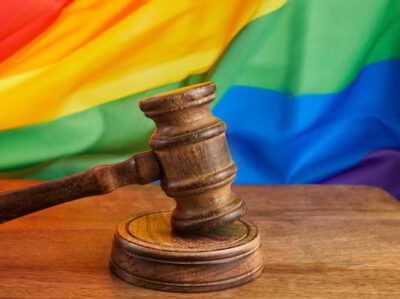The Genesis of Indian Queer Victory in 2018

Technology’s role in Recruitment Process Outsourcing: Pros, cons, and strategies
August 30, 2023
Amid layoffs, here’s how outplacement solutions are helping employees
September 14, 2023
While today marks five years since India's landmark decision to read down Section 377, the anniversary is also an opportunity to reflect on the many positive social changes and advances in LGBTQ+ rights that have taken place in the country since then. The Supreme Court's decision to overturn this antiquated colonial-era law on September 6, 2018, was a watershed moment in India's history because it not only decriminalised consensual same-sex relationships but also set the country on a path toward greater acceptance, inclusion, and equality for the LGBTQ+ community. The enormous efforts of innumerable individuals and advocacy groups for love, freedom, and diversity have brought us to this momentous victory.
This article looks at the genesis of the draconian section, highlighting the milestone moments of this remarkable journey.
History of Section 377
Section 377 of the Indian Penal Code read:
"Whoever voluntarily has carnal intercourse against the order of nature with any man, woman, or animal shall be punished with imprisonment for life, or with imprisonment of either description for a term which may extend up to ten years, and shall also be liable to a fine."
This law was introduced in 1861, during the British colonial era, and drafted by Thomas Macaulay. It was widely criticised for discriminating against and stigmatising the LGBTQ+ community in India.
India got its independence from the British in 1947, but the law stayed in place. The timeline of Section 377 is a story of resilience, legal challenges, and, finally, triumph against injustice.
In 1994, the AIDS Bhedbhav Virodhi Andolan (ABVA) filed the first petition against Section 377 IPC in the Delhi High Court, which was rejected, and the subject was swept under the carpet once again until 1998. That's when Deepa Mehta came forward with her path breaking film ‘FIRE’, starring Shabana Azmi and Nandita Das and depicting a lesbian relationship. Huge protests erupted across the country to ban the film, but it did the job of bringing the topic back into mainstream society.
In 2001, Naz Foundation, an NGO that actively works for the sexual health of Persons Living with HIV/AIDS, filed a petition against Sec. 377 before the Delhi High Court, which was again dismissed in 2004. The Delhi High Court denied the Naz Foundation's initial suit in 2004, setting the stage for a long battle for LGBTQ+ rights. The Supreme Court intervened two years later, asking the Delhi High Court to reconsider the Naz Foundation's suit. The year 2009 saw a crucial, though momentary, win when the Delhi High Court issued a landmark judgement decriminalising Section 377. The court bluntly asserted in its decision that this ancient regulation infringed on fundamental rights protected by the Constitution, notably Articles 14, 15, and 21. The war, however, was far from over.
The Supreme Court stunned the nation in 2013 when it overturned the Delhi High Court's ruling, calling it "legally unsustainable." The Supreme Court's reasoning was based on the fact that fewer than 200 people had been convicted under Section 377 in the previous century and a half. Furthermore, the court stated that the decision to keep or abolish such laws lay with Parliament. The LGBTQ+ community and their allies were forced to start from scratch and hide themselves in the proverbial closet again.
Then in 2014, the Naz Foundation filed a review appeal against the 2012 order, but it was summarily dismissed once again. Concurrently, the ruling government said that it would not take a position on Section 377 until the Supreme Court issued a definitive decision on the matter. The next year, the Lok Sabha rejected a private member's bill sponsored by Congress MP Shashi Tharoor to decriminalise homosexuality. The legislative path to equality remained riddled with stumbling blocks.
In 2017, the Supreme Court issued another major decision that acknowledged the right to privacy as a fundamental constitutional right. This particular moment in the campaign against Section 377 emphasised the importance of human sovereignty and personal decisions. The groundwork was laid for a rethink of the discriminatory statute.
The Supreme Court then began hearings in July 2018 on a series of petitions challenging the validity of Section 377 and reconsidering its 2012 judgement to re-criminalize homosexuality. The Constitution bench, which included Chief Justice of India Dipak Misra as well as Justices Rohinton Nariman, DY Chandrachud, AM Khanwilkar, and Indu Malhotra, began a historic deliberation.
Finally, on September 6, 2018, a defining moment for India's human rights and equality was born. Section 377 of the Indian Penal Code was read down by the Supreme Court in a landmark, unanimous judgement. "I am what I am, so take me as I am," the court said emphatically. This signified the end of the LGBTQ+ community's long and arduous court battle. It was a declaration of acceptance and freedom, echoing the Indian Constitution's principles of equality and decency.
Justice Indu Malhotra summed up the emotions of the entire nation when she said in her judgement, "History owes the LGBT community an apology for their sufferings”.
As a nation, we need to remember that an apology is only as good as the actions we put behind it. We may have corrected the historic wrong on paper, but with this, our journey towards a more just, fair, and inclusive society has only just begun.


